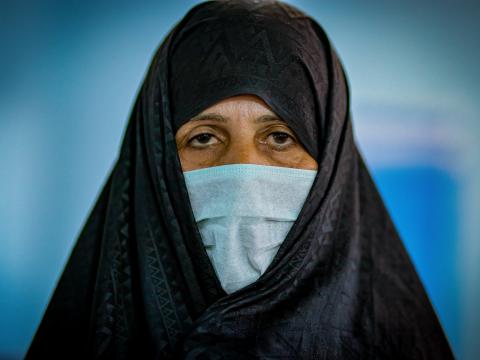Selling to be Alive

You could be forgiven for thinking that Gulsoom was 60 years old. But in reality she is only 45. Sadness and hardship have aged her way beyond her years. Gulsoom lost her husband 10 years ago in an accident, leaving her alone to care for their four children in Shalbafan area of Herat city.
“My husband was a vendor,” she says, “his income was enough for a simple life like most of the people in our area. My children were going to school and I was imagining a good future for them.” She looks down, lost in thought.
Gulsoom who’s never been to school, doesn’t have a job to support her kids. She managed to support her family by doing laundry and cracking pistachio.
“I managed the family cost with the help of my father and brother for about six months after my husband died, but they also had their own problems and their income was hardly covering their living expenses. I decided to stand on my feet and accept the fact and I have to support my children alone. It was hard but I had to. I went to the neighbors to do laundry, babysitting, cooking, cleaning, and doing whatever I could to make some money. Day by day, I was used to this situation and found my way in life again. My only hope was that someday my children would grow up and support me,” explained Gulsoom.
Gulsoom has been running her life under the same conditions for 10 years now. Her children also help her with some jobs, such as breaking pistachios. Although the cost of living is high for Gulsoom, the education of her children is a priority. "I did not go to school and this is my situation. My children should study and have a better future than I have. By doing heavy work in people's homes, I afford their education expenses, but I do not allow them to drop out of school," Gulsoom said.
The beginning of a new problem
Gulsoom was accustomed to these new living conditions and had a small daily income that was sufficient to support her family, but the situation suddenly got worse and she lost her meager income.
The worldwide spread of the COVID-19 has led to the quarantine of cities and the closure of many businesses around the world.
On 24 February, the first positive case of COVID-19 was registered by Afghan Ministry of Public Health (MoPH) from Herat province.
Many people who made a living from daily work lost their income due to the city lockdown and the closure of the market, and soon all their food supplies ran out. Most of them were forced to sell their valuables home appliance or borrow money from neighbors or friends to buy food. Most vulnerable households only had one time meal per day.
"Families who I have worked with for 10 years do not let me go their home for work due to fear from COVID-19. The markets are closed and no one even gives me pistachios to break, and this source of income shut down. For a while, with a little money saved, I was able to afford for my family, but it did not last long. I had to sell some house appliance items such as carpet, television, fan and even my children's winter clothes, to make some money,” said Gulsoom.
There are no governmental services in Gulsoom living area, making communities depend entirely on each other. “Conditions are getting worse every day. If this situation persists and I cannot have an income, we will starve to death," added Gulsoom.
The window of hope
A window of hope was found in a situation where Gulsoom was frustrated with everything and did not even have anything to sell. World Vision Afghansitan survey team came to her home to verify and select the most vulnerable households affected by COVID-19. Gulsoom met the criteria and was selected for unconditional cash distribution under the Fragile Context Programming Approach (FCPA) project funded by World Vision Canada, aiming to improve the socio-economic situation and the integration of IDPs and vulnerable host communities in the peri urban areas of Herat province.
Gulsoom was selected as a beneficiary for unconditional cash distribution. However, for Gulsoom, the programme was more than that: it meant being independent and getting back on her feet.
“World Vision gave me 20,700 Afghani ($270),” she explains; ““This was a great support in the right time. With this money, I can provide the basic needs for my children. I can buy food such as rice, flour and oil during the pandemic,” she says with a hopeful smile.
Gulsoom was one of 690 households who received cash assistance to support her children in peri urban areas of Herat, Afghanistan.

The economic status of vulnerable households deteriorates making it difficult for them to meet their basic food and income needs in western part of the country. COVID-19 Pandemic put more pressure on poor households' ability to physical and financially access to food. World Vision Afghanistan strives to address the problem, through providing food/ cash assistance to the most vulnerable families.
Through Fragile Context Programming Approach funded by several World Vision Support Offices and led by World Vision Canada, however, World Vision Afghanistan distributed unconditional cash to 690 households in peri urban areas of Herat, Afghanistan.